| Srl | Item |
| 1 |
ID:
090419
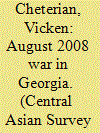

|
|
|
|
|
| Publication |
2009.
|
| Summary/Abstract |
Following the five days' war between Georgia and Russia, a highly politicized debate began about 'who started the war'. While this debate is far from over, it is important to analyse whether the 2008 war marks an important evolution in the series of conflicts that started in the Caucasus simultaneously with the weakening and collapse of the Soviet Union. While in the late 1980s and early 1990s the conflicts were the result of mass mobilization around the banner of the nation, marking a revolutionary period of paradigm shifts, the 2008 war was much closer to classical wars between states and their centrally commanded armies. The direct Russian military intervention, Moscow's recognition of Abkhazia and South Ossetia as 'independent' states, further modifies the nature of the Caucasus conflicts. The 2008 war also reveals how much the Georgian state has evolved since the Rose Revolution, from one described as 'weak state' to a state capable of surviving a military defeat without internal collapse.
|
|
|
|
|
|
|
|
|
|
|
|
|
|
|
|
| 2 |
ID:
006908
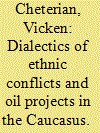

|
|
|
|
|
| Publication |
Geneva, PSIS, 1997.
|
| Description |
93p.
|
| Series |
PSIS paper; no.1
|
|
|
|
|
|
|
|
|
|
|
|
Copies: C:1/I:0,R:0,Q:0
Circulation
| Accession# | Call# | Current Location | Status | Policy | Location |
| 038779 | 305.8009479/CHE 038779 | Main | On Shelf | General | |
|
|
|
|
| 3 |
ID:
192655
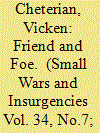

|
|
|
|
|
| Summary/Abstract |
The interaction between Russia and Turkey since 2015 suggests a new quality in foreign affairs combining tactical alliance and strategic competition. The Russian invasion of Ukraine did not change this. By studying the cases of Syria, Libya, and Nagorno-Karabakh, we observe not only elements of geopolitical competition and cooperation but also that the combination of the two contradictory approaches in foreign affairs created new opportunities beneficial to the two sides. Russian-Turkish interactions are a unique case study in international relations and are conditioned by their geopolitical competition with the west, a fact that the war in Ukraine did not alter.
|
|
|
|
|
|
|
|
|
|
|
|
|
|
|
|
| 4 |
ID:
181288
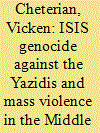

|
|
|
|
|
| Summary/Abstract |
The mass violence inflicted by the radical Islamist fighters of the ‘Islamic State’ organization on the Yazidi population of Iraq is the latest of modern genocides. The violence has placed this little known but ancient community of the Middle East at the centre of international attention, triggering direct international intervention in the fight against ISIS. This article aims to study the motives of ISIS in attacking the Kurds of northern Iraq and in particular the Yazidi population. It will also study the contradictory narratives that emerged in the aftermath of the attack to use it to critically challenge the grand-narratives of the modern history of the Middle East. If one writes the history of the Middle East from the experience and the perspective of the Yazidis, it will be a radically different one than those found in our history books. Hence, its subversive potential that needs to interrogate us.
|
|
|
|
|
|
|
|
|
|
|
|
|
|
|
|
| 5 |
ID:
116308
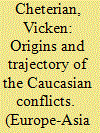

|
|
|
|
|
| Publication |
2012.
|
| Summary/Abstract |
Conflicts in the Caucasus began as a result of the weakening of the institutions of the Soviet Union. Since then there have been some major transformations. Initially, there were 'triangular conflicts' with the centre (Moscow) on the one side and two competing national projects on the other side (a Union Republic and a minority group with an autonomous status within this republic). After the collapse of the Soviet Union, these conflicts evolved into bilateral ones between two popular-nationalist movements with competing territorial claims: newly independent nation states, on the one hand, and minority groups with autonomous status, on the other.
|
|
|
|
|
|
|
|
|
|
|
|
|
|
|
|
| 6 |
ID:
160852
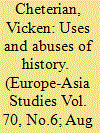

|
|
|
|
|
| Summary/Abstract |
Did the 1915 genocide of the Ottoman Armenians play a role in the genesis of the Karabakh war? In the early phase of the conflict, many Armenian activists and politicians drew parallels between the evolving struggles of the present and the traumatic events of 1915. This essay explores the ways in which Armenia, Azerbaijan and Turkey have referred to the events of 1915 to formulate their policies towards the conflict. The essay argues that the largely suppressed past trauma was present in the mass psychology of the conflicting parties, although in radically different ways, and that it shaped developing events. After depoliticising genocide commemorations in the early years of its independence, Armenia has recently witnessed an increase in references to the genocide in political discourse. The same also applies, somewhat paradoxically, to Azerbaijan, which has developed its own state-sponsored discourse of genocide, vehemently denying that the genocide took place while portraying Azerbaijan as a victim of genocide itself. This exchange of roles clearly needs further explanation.
|
|
|
|
|
|
|
|
|
|
|
|
|
|
|
|